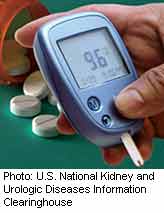Correlations differ by specific trans fatty acid and by method of assessment
THURSDAY, May 28, 2015 (HealthDay News) — Among older adults, specific trans fatty acids (TFAs) may be associated with diabetes mellitus (DM), according to a study published in the June issue of Diabetes Care.
Qianyi Wang, from the Harvard School of Public Health in Boston, and colleagues examined the effects of TFAs on type 2 DM by specific TFA subtype or method of assessment. Plasma phospholipid trans (t)-16:1n9, t-18:1, and cis (c)/t-, t/c-, and t/t-18:2 were measured in blood drawn from 2,919 adults (age 74 ± 5 years) free from DM in 1992 who were enrolled in the Cardiovascular Health Study. Dietary TFA was estimated among 4,207 adults free of prevalent DM in 1989 or 1996.
The researchers found that during 30,825 person-years of follow-up, there were 287 DM cases in biomarker analyses. After adjustment for de novo lipogenesis fatty acids, t-16:1n9 and t-18:1 levels correlated with higher incident DM. In the dietary analyses, during 50,105 person-years there were 407 DM cases. Incident DM correlated positively with total TFA consumption and with consumption of t-18:1 and t-18:2. The correlations of estimated dietary TFA with DM were attenuated and no longer significant after adjustment for other dietary habits.
“These findings highlight the need for further observational, interventional, and experimental studies of the effects TFA on DM,” the authors write.
One author disclosed financial ties to the biopharmaceutical, food, and nutrition industries.
Copyright © 2015 HealthDay. All rights reserved.








